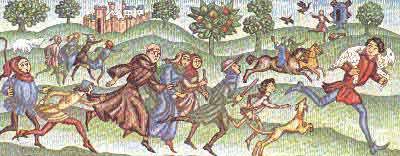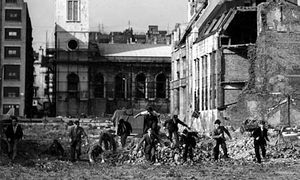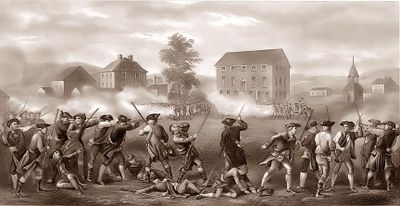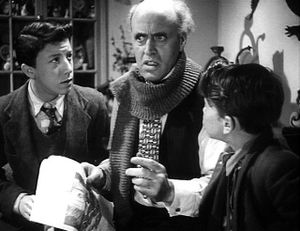Hue and cry: Difference between revisions
No edit summary |
No edit summary |
||
| Line 1: | Line 1: | ||
[[File:Hue-And-Crypig.jpg|left|450px|thumb|All Neighbors chase a pig thief together, because your neighbors loss is the same as your loss.]] | [[File:Hue-And-Crypig.jpg|left|450px|thumb|All Neighbors chase a pig thief together, because your neighbors loss is the same as your loss.]] | ||
Revision as of 23:59, 26 January 2015

Love thy Neighbor
In common law, a hue and cry is a process by which bystanders are summoned to assist in the apprehension of a criminal who has been witnessed in the act of committing a crime.
- a loud outcry formerly used in the pursuit of one who is suspected of a crime
- the pursuit of a suspect or a written proclamation for the capture of a suspect
- a clamor of alarm or protest
Hue & Cry – posse comitatus
- "The roots of local responsibility for crime prevention seem to lie in Anglo-Saxon customs that placed prevention squarely on the local community through the tithing and the “Hue and Cry”. Every male over the age of 12 had to belong to a group of nine others, called a tithing. These ten men were responsible for the behaviour of each other. If one of them broke the law, the others had to bring that person before the court. The sanction, to make the system work, was that if they did not, they would all be held responsible for the crime." Credited to and Published by the Bingham Heritage Trails Association
By the Statute of Winchester of 1285, 13 Edw. I cc. 1 and 4, it was provided that anyone, either a constable or a private citizen, who witnessed a crime shall make hue and cry, and that the hue and cry must be kept up against the fleeing criminal from town to town and from county to county, until the felon is apprehended and delivered to the sheriff.
All able-bodied men, upon hearing the shouts, were obliged to assist in the pursuit of the criminal, which makes it comparable to the posse comitatus. It was moreover provided that "the whole hundred … shall be answerable" for any theft or robbery, in effect a form of collective punishment. Those who raised a hue and cry falsely were themselves guilty of a crime.
The reference to "the whole hundred" has to do with prominent system of government known as the tens, hundreds and thousands which stemmed back to before ancient Israel. All free people used some form of these networking groups bound together by a common sense of justice, or what became known as the common law.
Anglo-Saxons, Tuns, were divided into family groups of ten, called a Tithing. Ten of these family assemblies formed a hundred and ten hundreds formed a thousand. They were the means by which all charity, justice and warfare were conducted.
In Oliver Twist, Fagin reads the Hue and Cry which was an early name of the weekly Police Gazette (UK) magazine detailing crimes and wanted people.
Etymology
It is possible that it is an Anglicization via Anglo-French of the Latin, hutesium et clamor, meaning "a horn and shouting". But other sources indicate that it has always been a somewhat redundant phrase meaning an outcry and cry. "Hue" appears to come from the Old French huer which means to shout, and Old French crier which means to cry.
“The civil law reduces the unwilling freedman to his original slavery; but the laws of the Angloes judge once manumitted as ever after free.”[1]
“The term republic, res publica, signifies the state independently of its form of government.”[2]
Social contract bind the people as they apply to the Welfare state for benefits at the expense of their neighbor. This coveting relationship with the Benefactors of the State makes the people human resources.

During hard times or in the case of war people form natural bonds that often give them more strength than their adversaries. Loyalty, honor, brotherhood bring a strength of their own to a situation that makes a superior regiment to what should be considered a weaker opponent.
The social compact enforced by men who exercise authority over the community can undermine the brotherhood of society. Social welfare dependent upon faith hope and charity nurture the honor of society so that when catastrophe overcomes a community the people are better prepared to meet it with mutual resolve and concern, having become accustomed to the process over time.

Early America
When America was first settled the people had to rethink their view of society. While colonies like Plymouth and James town began with a socialist view, starvation and death eventually rejected the idea of from each according to his ability and to each according to his need. This had produced constant shortages and injustice.
When private property was secured from the state famine ended and charity began. This changed the course of history and set the scene for liberty.
Early American colonies had to defend one another against the elements of a wilderness and the savagery of those times. It altered society so that love and honor was already the life blood of that society.
A departure from those ways will again alter society to its beggarly estate.
There is a lot of injustice today but it goes unseen because the people have become slothful and apathetic. There needs to be a hue and cry in the land and the people need to learn to attend to the Weightier matters.

Christ Issues
What are the issues of Christ? What did he condemn in that society? It was the Corban of the Pharisees that made the word of God to no effect. It was the fact that they did not bear fruit and failed to attend to What Jesus called the Weightier matters of the law, judgment, mercy, and faith which include caring for the needs of our neighbors and the widows and orphans of our society through Pure Religion in matters of health, education, and welfare. We are NOT to provide for the needy of society through the Covetous Practices and the men who call themselves benefactors but who exercise authority one over the other like the socialists do.
The Way of Christ was like neither the way of the world of Rome nor the governments of the gentiles who depend on those fathers of the earth through force, fear and fealty who deliver the people back in bondage again like they were in Egypt. Christ's ministers and true Christians do not depend upon systems of social welfare that force the contributions of the people like the corban of the Pharisees which made the word of God to none effect. Many people have been deceived to go the way of Balaam and the Nicolaitan and out of The Way of Christ and have become workers of iniquity.
The Christian conflict with Rome in the first century Church appointed by Christ was because they would not apply to the fathers of the earth for their free bread but instead relied upon a voluntary network providing a daily ministration to the needy of society through Faith, Hope, and Charity by way of freewill offerings of the people, for the people, and by the people through the perfect law of liberty in Free Assemblies according to the ancient pattern of Tuns or Tens as He commanded.
The modern Christians are in need of repentance.
"Follow me!" —Jesus the Christ.
- One of the most important things to do is to become involved in a network of Charitable Practices. Everyone should want to join a Living Network of Love and Charity.
- If you think you have a calling to be a Minister of God or you might want to dedicate your life to Christ as an Ordained Minister of His Holy Church, contact us to start the process of discipleship and become the benefactors who exercise only love, NOT authority.[3]
.
This means that if you believe in Christ you need to Network together in a community and society of love and sacrifice. It means you have to give and forgive with courage and honor to those who seek a righteous resolution to those matters.
The socialist state weakens the poor in a time of affluence and then bankrupts the state in spirit and in truth.
We need to repent and turn around and Live as if the state does not exist.
Hue and cry |
Go and cry |
Cry out |
Employ |
Land |
Mind |
Corban |
Christian conflict |
Nicolaitan |
Religion |
Pure Religion |
Welfare types |
Daily ministration |
Self-Sacrifice |
Repent |
Weightier matters |
Altars |
Sophistry |
Friend |
Stones |
Forgiveness |
Forgive |
Forgive them |
In need of forgiveness |
Wantonness |
Covet |
Negotiating Health Care Costs |
Law
Law |
Natural Law |
Legal title |
Common Law |
Fiction of law |
Stare decisis |
Jury |
Voir dire |
Consent |
Contract |
Parental contract |
Government |
Civil law |
Civil Rights |
Civil Government |
Governments |
No Kings |
Canon law |
Cities of refuge |
Levites |
Citizen |
Equity |
The Ten Laws |
Law of the Maat |
Bastiat's The Law and Two Trees |
Trees |
The Occupy Refuge Movement |
Clive Bundy |
Hammond |
Barcroft |
Benefactors |
Gods |
Jury |
Sanhedrin |
Protection |
Weightier matters |
Social contract |
Community Law |
Perfect law of liberty |
Power to change |
Covet |
Rights |
Anarchist |
Agorism |
Live as if the state does not exist |
Drugged
Mark Taylor |
Bret Bohn |
Justina |
Mind |
Capgras |
Crazy |
Autism |
Vaccines |
Schizophrenia |
Trauma |
Network
== Footnotes ==
- ↑ Libertinum ingratum leges civiles in pristinalm servitutem redigulnt; sed leges angiae semel manumissum semper liberum judicant. Co. Litt. 137.
- ↑ Bouvier’s Vol.1. page 13 (1870).
- ↑ Matthew 20:25-26 But Jesus called them unto him, and said, Ye know that the princes of the Gentiles exercise dominion over them, and they that are great exercise authority upon them. But it shall not be so among you: but whosoever will be great among you, let him be your minister;
Mark 10:42-43 But Jesus called them to him, and saith unto them, Ye know that they which are accounted to rule over the Gentiles exercise lordship over them; and their great ones exercise authority upon them. But so shall it not be among you: but whosoever will be great among you, shall be your minister:
Luke 22:25-26 And he said unto them, The kings of the Gentiles exercise lordship over them; and they that exercise authority upon them are called benefactors. But ye shall not be so: but he that is greatest among you, let him be as the younger; and he that is chief, as he that doth serve.
About the author
Subscribe
HELP US at His Holy Church spread the word by SUBSCRIBING to many of our CHANNELS and the Network.
The more subscribers will give us more opportunity to reach out to others and build the network as Christ commanded.
Join the network.
Most important is to become a part of the Living Network which is not dependent upon the internet but seeks to form The bands of a free society.
You can do this by joining the local email group on the network and helping one another in a network of Tens.
His Holy Church - YouTube
https://www.youtube.com/user/hisholychurch
Bitchute channel will often include material that would be censored.
https://www.bitchute.com/channel/o6xa17ZTh2KG/
Rumble Channel gregory144
https://rumble.com/user/gregory144
To read more go to "His Holy Church" (HHC) https://www.hisholychurch.org/
Brother Gregory in the wilderness.
https://www.youtube.com/channel/UCJSw6O7_-vA4dweVpMPEXRA
About the author, Brother Gregory
https://hisholychurch.org/author.php
PreparingU - YouTube
https://www.youtube.com/channel/UC9hTUK8R89ElcXVgUjWoOXQ
Facebook
https://www.facebook.com/HisHolyChurch
